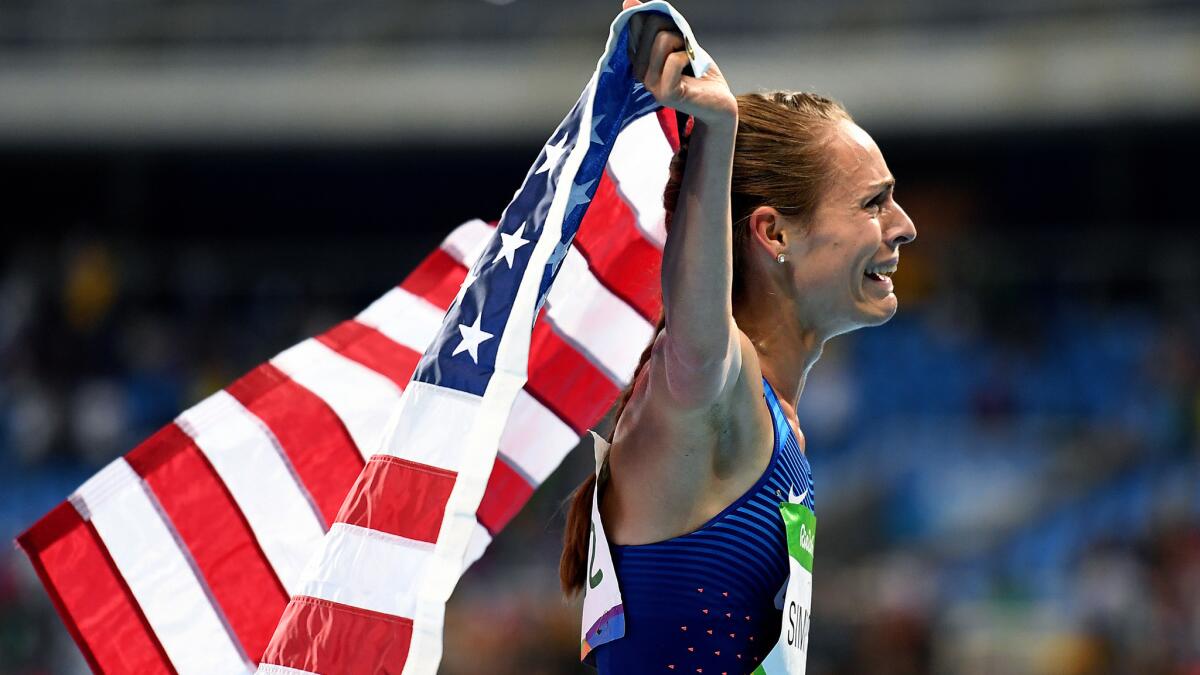Jenny Simpson gets first medal for U.S. in women’s 1,500 meters

Reporting from Rio de Janeiro — Jenny Simpson was more nervous before the semifinal of the Rio Olympic 1,500-meter race than she was before Tuesday’s final, with the world watching. Her mind clear and her legs strong, she took to heart her coaches’ advice to use the first two laps to establish position and the last two laps “to be a predator.” She was fully prepared for this moment.
“This is what I prayed for. This is what I worked for, just to have a shot,” she said. “Standing on the starting line I feel the only thing ahead of me is opportunity.”
Simpson later didn’t recall much about a slow, tactical race that took a late fast turn. She knew she fell to the ground afterward and “ugly-cried” only because people told her that’s how she reacted following her third-place finish, which secured the first medal for a U.S. woman in the event.
Faith Kipyegon of Kenya overtook world-record holder Genzebe Dibaba of Ethiopia in the final 200 meters to win in 4 minutes, 8.92 seconds, with Diababa in at 4:10.27. Simpson, who won the 2011 world championship, was second in 2013 and unlucky last year when she lost a shoe in mid-race, finished in 4:10.53 to etch her name in history.
I want to be someone that this country can be really proud to cheer for.
— Jenny Simpson
“To be the first American woman to medal in the 1,500 meters is something that I have not allowed myself to think about until now. It just feels incredible,” said Simpson, a former steeplechaser and longtime resident of Boulder, Colo.
“I want to be someone that this country can be really proud to cheer for, and I didn’t decide to want to be that person this week or this year. I wanted to be that person eight years ago and 10 years ago at my first world championships. This has been a long ride of highs and lows, and hopefully every American watching my race tonight, I want each of them to feel they can take a small piece of ownership in this medal.”
She can now claim to be the best American 1,500-meter runner of all-time. “It makes me feel amazing because I’ve done it honestly and clean and with everything that’s just inside my own body being expressed out on the track,” said Simpson, who finished one spot ahead of compatriot Shannon Rowbury (4:11.05).
Clean isn’t a word always used about this event. Six of the top nine finishers in the women’s London Olympic 1,500 final were sanctioned for drug-related offenses, and Dibaba has faced questions about her association with coach Jama Aden, who was arrested in Spain in June and was found to have EPO and other banned substances. “I am crystal clear from doping,” Dibaba said Tuesday through an interpreter.
In another noteworthy moment, triple jumper Will Claye finished second to U.S. teammate Christian Taylor for the second straight Olympics but still had a great day: After the event he climbed into the stands to propose to his girlfriend, 2008 Olympic hurdler Queen Harrison, and she accepted. “It was stressful because I didn’t know if she was going to say yes or not,” he said.
He had less stress jumping, hitting 17.76 meters (58 feet 3 ¼ inches) on his first leap. Taylor’s winning jump was 17.86 meters (58-7 ¼). “I never thought on my first jump that would be the gold-medal jump, but I just stayed sharp and stayed ready,” said Taylor, also a two-time world champion.
Usain Bolt of Jamaica, winner of the 100-meter dash on Sunday, advanced to the semifinals of the 200 with a first-round time of 20.28. “I’ve recovered from the 100 meters,” he said. “I’m tired now but happy to be through.” Andre De Grasse of Canada, the 100-meter bronze medalist, had the fastest time Tuesday, 20.09 seconds. American Justin Gatlin, the 100-meter silver medalist advanced (20.42), as did 400-meter bronze medalist LaShawn Merritt (20.15) and Ameer Webb of Tustin (20.31)
In other finals, Omar McLeod of Jamaica won the 110-meter hurdles in 13.05 seconds, ahead of Spain’s Orlando Ortega (13.17) and France’s Dmitri Bascou (13.24), and Canada’s Derek Drouin won the high jump with a leap of 2.38 meters (7 feet, 9 ¾ inches). American Eric Kynard, the 2012 silver medalist, was sixth.
Former USC standout Dalilah Muhammad led qualifying for the women’s 400 hurdles with a time of 53.89 seconds. Ashley Spencer also advanced, but 17-year-old New Jersey high schooler Sydney McLaughlin did not.
Brianna Rollins led qualifying for the 100-meter hurdles, with a time of 12.54 seconds. Kristi Castlin (12.68) and former USC start Nia Ali (12.76) also advanced. Brittney Reese and Tianna Bartoletta advanced to the long jump final.
The day had begun with a grace note in the first round of the women’s 5,000. Abbey D’Agostino of Topsfield, Mass., and Nikki Hamblin of New Zealand displayed great sportsmanship by helping each other up after they collided late in the race, and although they finished well behind the field they were reinstated for Friday’s final.
D’Agostino injured her knee and might be unable to compete, but she and Hamblin should be remembered as winners. “That girl is the Olympic spirit right there,” Hamblin said.
So was Simpson, in her own historic way.
Twitter: @helenenothelen
MORE OLYMPICS NEWS
2016 Summer Olympics live coverage: Here is why American women are dominating
Column: American women are dominating the Games, and it didn’t happen by accident
Simone Biles finds herself in the stratosphere of Olympic stars with fourth gold medal
More to Read
Go beyond the scoreboard
Get the latest on L.A.'s teams in the daily Sports Report newsletter.
You may occasionally receive promotional content from the Los Angeles Times.







